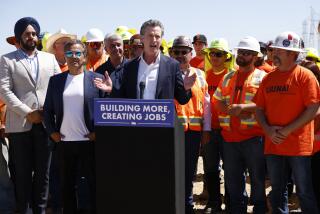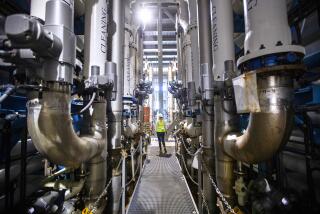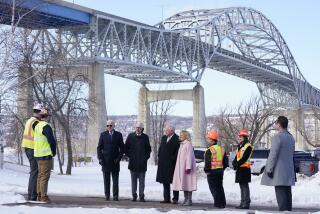Obama is urged to lead on public works
- Share via
WASHINGTON — Two prominent governors, California’s Arnold Schwarzenegger and Pennsylvania’s Edward G. Rendell, sent a memo to President Obama saying he needed to assert more political leadership instead of leaving it to Congress to draft a plan for improving the nation’s aging highways, bridges and ports.
In particular, Rendell said he was concerned that Congress -- left to its own devices -- would load up a future infrastructure plan with “earmarks” and other narrowly focused spending priorities that undermined its credibility and effectiveness.
At a meeting with the president last month, the two governors and New York Mayor Michael R. Bloomberg discussed the memo they had sent to the White House, a draft of which reads: “It is very important that the administration be proactive rather than left reacting to congressional proposals.”
In the coming months, Congress will consider a bill to set aside as much as $450 billion for highway and other infrastructure projects over a span of six years. House aides said members of Congress intended to insert special projects, or earmarks, into the bill, despite warnings from Obama that he wanted to rein in such spending.
As yet, the Senate has not decided how it will handle earmarks in the bill, said an aide to Sen. Barbara Boxer (D-Calif.), chairwoman of the Environment and Public Works Committee.
Rendell cautioned in an interview that if the bill was larded with earmarks, it could jeopardize the political consensus needed to modernize the nation’s network of roads.
“If your administration is to have a substantive impact on this key legislation,” the memo reads, “you must take the lead in setting forth a new national vision for infrastructure policy, as well [as] articulating goals and program specifics for this once-a-decade legislative vehicle.”
Strengthening the commitment to public works was one of Obama’s major campaign pledges.
But the call for the White House to take the lead in drafting a major bill collides with Obama’s approach so far. And it was unclear whether the president was prepared to change his strategy.
On the mammoth economic stimulus bill, which represents Obama’s biggest legislative achievement to date, he largely deferred to Congress, letting the House and Senate hash out the details while he supplied the broad goals.
Sen. Dianne Feinstein (D-Calif.) said she was worried that the administration would adopt a similar strategy in the healthcare debate. She would rather see the administration come out with its own healthcare reform bill.
“It’s very hard when you say, like with the stimulus, ‘We’ll let the Congress form it,’ ” Feinstein said in an interview. “You have 435 people in the House, 100 in the Senate. There are maybe two dozen different views on something as big as healthcare.”
The president’s approach to infrastructure spending involves high stakes. A 2009 report card by the American Society of Civil Engineers gave the nation’s infrastructure a grade of D, declaring that more than one-quarter of the nation’s bridges were either “structurally deficient or functionally obsolete.” The report card also showed that poor road conditions cost motorists $67 billion a year in repairs and operating costs.
It would take an investment of $1.1 trillion more than is planned over the next five years to bring the infrastructure up to good condition, said the civil engineers group, whose members play a major role in carrying out infrastructure projects.
The stimulus bill signed by the president contained $150 billion for infrastructure. And a national infrastructure “bank” proposed by the president would set aside just $25 billion spread over five years. The memo to Obama talked of a vastly larger outlay: $500 billion injected into the new infrastructure bank through debt financing.
“We also strongly believe that the infrastructure bank can play a role as a funding source for projects that have major national impact or are multi-state and to accomplish this, its federal funding would need to be much larger,” the memo said.
With other priorities demanding the president’s attention and with federal deficit projections rising, infrastructure is at risk of becoming a secondary concern.
A powerful Senate Democrat, Finance Committee Chairman Max Baucus of Montana, has taken aim at the infrastructure bank proposal, objecting that it could become a vehicle to underwrite public housing and water treatment systems important to cities, at the expense of rural areas.
Also, at a hearing last month of Boxer’s Environment and Public Works Committee, lawmakers from both parties voiced frustration that the Obama administration hadn’t put forward concrete ways to pay for some of the needed transportation improvements.
Sen. Frank R. Lautenberg (D-N.J.) told Transportation Secretary Ray LaHood: “We’re going to have to get leadership from the administration on these things. We can battle it out here, but if we come up to [the Office of Management and Budget] and they say, ‘Not possible,’ where are we?”
LaHood countered: “You’ll see the leadership. But we need a little bit of time here. The president has been a little bit preoccupied with a few other things. We’re trying to get his attention on these things. We will get his attention.”
The memo sent to Obama was under the heading of a coalition called Building America’s Future, which is chaired by Schwarzenegger, Rendell and Bloomberg. All three have been proponents of upgrading the nation’s public works system. Schwarzenegger is a Republican, Rendell a Democrat and Bloomberg an independent.
The organization offered to help Obama create political conditions favorable to infrastructure improvements. In the memo, the officials suggest a White House summit devoted to public works projects -- similar to a session on healthcare held at the White House last month.
Another idea mentioned was a series of regional meetings in which businesses, politicians, labor unions, civic groups and others would talk about infrastructure and ways to underwrite improvements.
Rendell said the president was supportive during the meeting at the White House. “He turned to his aides gathered around a table and said, ‘Well, you guys are right,’ ” Rendell said. “And he turned to his group on his side of the table and said, ‘OK, let’s get to work.’ ”
Still, Rendell voiced concern that earmarks would derail the effort.
If the political clout of a member of Congress is what determines how infrastructure money is spent, Rendell said, “we are wasting an opportunity for the next half decade or full decade.”
--
More to Read
Get the L.A. Times Politics newsletter
Deeply reported insights into legislation, politics and policy from Sacramento, Washington and beyond. In your inbox three times per week.
You may occasionally receive promotional content from the Los Angeles Times.










